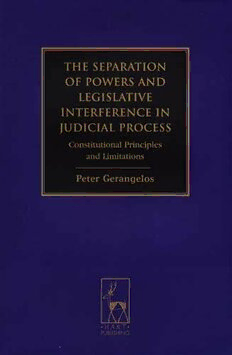
The Separation of Powers and Legislative Interference in Judicial Process: Constitutional Principles and Limitations PDF
361 Pages·2009·1.776 MB·English
Most books are stored in the elastic cloud where traffic is expensive. For this reason, we have a limit on daily download.
Preview The Separation of Powers and Legislative Interference in Judicial Process: Constitutional Principles and Limitations
Description:
This book examines the constitutional principles governing the relationship between legislatures and courts at that critical crossroads of their power, where legislatures may seek to intervene in the judicial process — or to interfere with judicial functions — to secure outcomes consistent with their policy objectives or interests. Cases of high political moment are usually involved, where the temptation, indeed political imperative, for legislatures to intervene can be overwhelming. Although the methods of intervention are various, unbridled legislative power in this regard has been a continuing concern in all common law jurisdictions. Prominent examples include direct legislative interference in pending cases, usurpation of judicial power by legislatures, limitations on the jurisdiction of courts, strategic amendments to law applicable to cases pending appeal, and attempts directly to overturn court decisions in particular cases. Because the doctrine of the separation of powers, as an entrenched constitutional rule, is a major principle, this book examines in detail the jurisprudence of the US and Australia in particular. These jurisdictions have identical constitutional provisions entrenching that doctrine, as well as the most developed jurisprudence on this point. The legal position in the UK, which does not have an entrenched separation of powers doctrine, will be examined as a counterpoint. Other relevant jurisdictions — such as Canada, Ireland, and India — are also examined in the context of particular principles, particularly when their respective jurisprudence is rather more developed on discrete points. The book examines how the relevant constitutional principles strive to maintain the primacy of the law-making role of the legislature in a representative democracy and yet afford the decisional independence of the judiciary.
See more
The list of books you might like
Most books are stored in the elastic cloud where traffic is expensive. For this reason, we have a limit on daily download.
